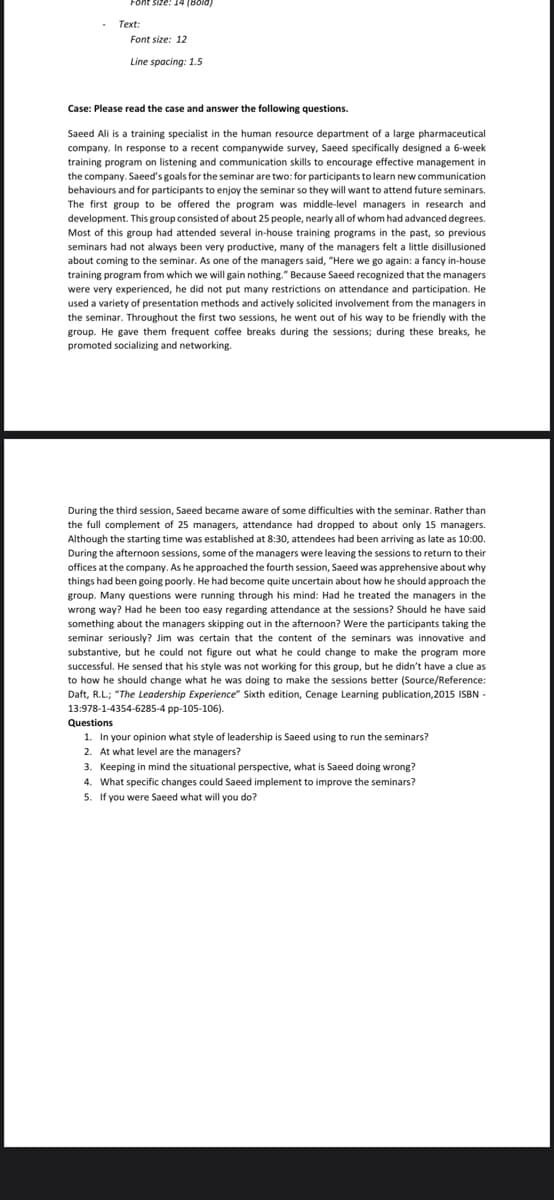to how he should change what he was doing to make the sessions better (Source/Referenc Daft, R.L; "The Leadership Experience" Sixth edition, Cenage Learning publication,2015 ISBN 13:978-1-4354-6285-4 pp-105-106). Questions 1. In your opinion what style of leadership is Saeed using to run the seminars? 2. At what level are the managers? 3. Keeping in mind the situational perspective, what is Saeed doing wrong? 4. What specific changes could Saeed implement to improve the seminars? 5. If you were Saeed what will you do?
to how he should change what he was doing to make the sessions better (Source/Referenc Daft, R.L; "The Leadership Experience" Sixth edition, Cenage Learning publication,2015 ISBN 13:978-1-4354-6285-4 pp-105-106). Questions 1. In your opinion what style of leadership is Saeed using to run the seminars? 2. At what level are the managers? 3. Keeping in mind the situational perspective, what is Saeed doing wrong? 4. What specific changes could Saeed implement to improve the seminars? 5. If you were Saeed what will you do?
Chapter1: Taking Risks And Making Profits Within The Dynamic Business Environment
Section: Chapter Questions
Problem 1CE
Related questions
Question
Could you please help me with questions 1 and 3.

Transcribed Image Text:Font
Size: 14 (Bold)
Text:
Font size: 12
Line spacing: 1.5
Case: Please read the case and answer the following questions.
Saeed Ali is a training specialist in the human resource department of a large pharmaceutical
company. In response to a recent companywide survey, Saeed specifically designed a 6-week
training program on listening and communication skills to encourage effective management in
the company. Saeed's goals for the seminar are two: for participants to learn new communication
behaviours and for participants to enjoy the seminar so they will want to attend future seminars.
The first group to be offered the program was middle-level managers in research and
development. This group consisted of about 25 people, nearly all of whom had advanced degrees.
Most of this group had attended several in-house training programs in the past, so previous
seminars had not always been very productive, many of the managers felt a little disillusioned
about coming to the seminar. As one of the managers said, "Here we go again: a fancy in-house
training program from which we will gain nothing." Because Saeed recognized that the managers
were very experienced, he did not put many restrictions on attendance and participation. He
used a variety of presentation methods and actively solicited involvement from the managers in
the seminar. Throughout the first two sessions, he went out of his way to be friendly with the
group. He gave them frequent coffee breaks during the sessions; during these breaks, he
promoted socializing and networking.
During the third session, Saeed became aware of some difficulties with the seminar. Rather than
the full complement of 25 managers, attendance had dropped to about only 15 managers.
Although the starting time was established at 8:30, attendees had been arriving as late as 10:00.
During the afternoon sessions, some of the managers were leaving the sessions to return to their
offices at the company. As he approached the fourth session, Saeed was apprehensive about why
things had been going poorly. He had become quite uncertain about how he should approach the
group. Many questions were running through his mind: Had he treated the managers in the
wrong way? Had he been too easy regarding attendance at the sessions? Should he have s
something about the managers skipping out in the afternoon? Were the participants taking the
seminar seriously? Jim was certain that the content of the seminars was innovative and
substantive, but he could not figure out what he could change to make the program more
successful. He sensed that his style was not working for this group, but he didn't have a clue as
to how he should change what he was doing to make the sessions better (Source/Reference:
Daft, R.L; "The Leadership Experience" Sixth edition, Cenage Learning publication,2015 ISBN -
13:978-1-4354-6285-4 pp-105-106).
Questions
1. In your opinion what style of leadership is Saeed using to run the seminars?
2. At what level are the managers?
3. Keeping in mind the situational perspective, what is Saeed doing wrong?
4. What specific changes could Saeed implement to improve the seminars?
5. If you were Saeed what will you do?
Expert Solution
This question has been solved!
Explore an expertly crafted, step-by-step solution for a thorough understanding of key concepts.
This is a popular solution!
Trending now
This is a popular solution!
Step by step
Solved in 2 steps

Knowledge Booster
Learn more about
Need a deep-dive on the concept behind this application? Look no further. Learn more about this topic, management and related others by exploring similar questions and additional content below.Recommended textbooks for you

Understanding Business
Management
ISBN:
9781259929434
Author:
William Nickels
Publisher:
McGraw-Hill Education

Management (14th Edition)
Management
ISBN:
9780134527604
Author:
Stephen P. Robbins, Mary A. Coulter
Publisher:
PEARSON

Spreadsheet Modeling & Decision Analysis: A Pract…
Management
ISBN:
9781305947412
Author:
Cliff Ragsdale
Publisher:
Cengage Learning

Understanding Business
Management
ISBN:
9781259929434
Author:
William Nickels
Publisher:
McGraw-Hill Education

Management (14th Edition)
Management
ISBN:
9780134527604
Author:
Stephen P. Robbins, Mary A. Coulter
Publisher:
PEARSON

Spreadsheet Modeling & Decision Analysis: A Pract…
Management
ISBN:
9781305947412
Author:
Cliff Ragsdale
Publisher:
Cengage Learning

Management Information Systems: Managing The Digi…
Management
ISBN:
9780135191798
Author:
Kenneth C. Laudon, Jane P. Laudon
Publisher:
PEARSON

Business Essentials (12th Edition) (What's New in…
Management
ISBN:
9780134728391
Author:
Ronald J. Ebert, Ricky W. Griffin
Publisher:
PEARSON

Fundamentals of Management (10th Edition)
Management
ISBN:
9780134237473
Author:
Stephen P. Robbins, Mary A. Coulter, David A. De Cenzo
Publisher:
PEARSON